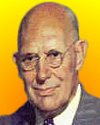
Charles Franklin Kettering, born on 29 Aug 1876, accomplished much in the automobile industry while he was vice president and director of research for General Motors Corp (1920-47). He was an American engineer who held 140 patent.
Weekly, from September 1942 to July 1945, Kettering gave five-minute intermission talks about Science and Invention during the radio broadcasts of the General Motors Symphony of the Air. These radio talks are a fascinating legacy from the mind of a prolific inventor. The obvious anachronisms now add a historical perspective of the war-time period in which they were written.
Among the 59 stories, you should surely find several that interest you, especially those that praise inventions of the era that turned out to be less than beneficial in the long run.
This link takes you to the index pages of these Short Stories of Science and Invention from a General Motors booklet of selected talks. Looking through the index, you can choose from the titles of these stories to find those that interst you. Each one is a quick read.

On 29 Aug 1749, Sir Gilbert Blane was born. He introduce lemon juice into the diet of mariners, and turned the tide of sickness and deaths in the British navy due to scurvy. The value of citrus juices was discover earlier, by James Lind, but it was Blane who, while head of the Navy Medical Board, who put that knowledge to good use.
Scurvy took a terrible toll in the Age of Sail, killing more sailors than were lost in all sea battles combined. In the years before this cure was established, there had been willful ignorance among the royal medical elite, who endorsed ludicrous medical theories based on speculative research while ignoring the life-saving properties of citrus fruit, cost tens of thousands of lives and altered the course of many battles at sea.
Today's book pick is: Scurvy: How a Surgeon, a Mariner, and a Gentlemen Solved the Greatest Medical Mystery of the Age of Sail, by Stephen R. Bown, who provides a well-paced narrative that weaves together the contributions of James Lind (the surgeon), James Cook (the mariner), and Gilbert Blane (the gentleman) worked separately to eliminate the dreaded affliction. The award-winning author provides both historic as well as scientific insights over the span of 60 years in the quest for a cure for the horrendous disease.
Britain's sick sailors were overmatched by France's much larger (though also sick) forces, putting the kibosh on Britain's retention of its 13 American colonies. There is much to learn from this combination of compelling history and classic adventure story.
It is available from Amazon, typically about New from $52.00. Used from $1.47. (As of earlier time of writing - subject to change.)
 | An inventor is simply a fellow who doesn’t take his education too seriously. You see, from the time a person is six years old until he graduates form college he has to take three or four examinations a year. If he flunks once, he is out. But an inventor is almost always failing. He tries and fails maybe a thousand times. It he succeeds once then he’s in. These two things are diametrically opposite. We often say that the biggest job we have is to teach a newly hired employee how to fail intelligently. We have to train him to experiment over and over and to keep on trying and failing until he learns what will work. |
| no image | Science is a first-rate piece of furniture for a man’s upper chamber, if he has common sense on the ground floor. But if a man hasn’t got plenty of good common sense, the more science he has the worse for his patient. |
 | God having designed man for a sociable creature, furnished him with language, which was to be the great instrument and tie of society. |
| Before you look at today's web page, see if you can answer some of these questions about the events that happened on this day. Some of the names are very familiar. Others will likely stump you. Tickle your curiosity with these questions, then check your answers on today's web page. | |
| Births | |
 | Charles F. Kettering, born 29 Aug 1915, was an American engineer whose inventions were instrumental in developing the modern automobile. What is his best-known invention for the automobile? |
| Deaths | |
 | Charles Darrow, born 29 Aug 1889, was an American inventor who designed a still well-known board game. His patent titled it a "Board Game Apparatus" and described it as “intended primarily to provide a game of barter.” Can you name this game? |
| Events | |
 | On 29 Aug 1982 an atom of a new element was made. It has been given the proposed name of Meitnerium. Physicists at the Heavy Ion Research Laboratory, Darmstadt, West Germany made and identified element 109 by bombing a target of Bi-209 with accelerated nuclei of Fe-58. What is the proposed symbol for this element? |
 | On 29 Aug in 1982, the 52,000-mile “Transglobe” expedition was completed, a first in the circumnavigation of the world What was new about this circumnavigation journey? |
 | On 29 Aug of a certain year, an astronaut in space held a conversation with an aquanaut in Sealab II below the Pacific Ocean In what decade did this take place? |
Fast answers for the previous newsletter for August 28: computerized axial tomography • birds, to study and to paint for his field guides • Bowie = American; Edgeworth David = Australia; Haug = French; Smith = England and Wales • floating bridge • Scientific American • Worcestershire Sauce.
 If you enjoy this newsletter, the website, or wish to offer encouragement or ideas, please send feedback by using your mail reader Reply button.
If you enjoy this newsletter, the website, or wish to offer encouragement or ideas, please send feedback by using your mail reader Reply button. Your click on a Facebook, StumbleUpon, or other social button on the site webpages is also a welcome sign of appreciation. Thank you for using them.
© This newsletter is copyright 2020 by todayinsci.com. Please respect the Webmaster's wishes and do not put copies online of the Newsletter — or any Today in Science History webpage. (If you already have done so, please remove them. Thank you.) Offline use in education is encouraged such as a printout on a bulletin board, or projected for classroom viewing. Online, descriptive links to our pages are welcomed, as these will provide a reader with the most recent revisions, additions and/or corrections of a webpage. For any other copyright questions, please contact the Webmaster by using your mail reader Reply button.
--
If you do not want to receive any more newsletters, Unsubscribe
To update your preferences and to unsubscribe visit this link
Executive Real Estate Business Class
-
"It was like a man with wings. It wasn't like anything you'd see on TV or in a monster movie." ...
About the publisher
Search This Blog
Blog Archive
-
▼
2021
(585)
-
▼
August
(32)
- Newsletter for Tuesday 31 August.
- Newsletter for Monday 30 August.
- Newsletter for Sunday 29 August.
- Newsletter for Saturday 28 August.
- Newsletter for Friday 27 August.
- Newsletter for Thursday 26 August.
- Newsletter for Wednesday 25 August.
- Newsletter for Tuesday 24 August.
- Newsletter for Monday 23 August.
- All-New Tonight: 'The Machines That Built America'
- Newsletter for Sunday 22 August.
- Newsletter for Saturday 21 August.
- Newsletter for Friday 20 August.
- Newsletter for Thursday 19 August.
- Newsletter for Wednesday 18 August.
- Newsletter for Tuesday 17 August.
- Newsletter for Monday 16 August.
- Newsletter for Sunday 15 August.
- Newsletter for Saturday 14 August.
- Newsletter for Friday 13 August.
- Newsletter for Wednesday 11 August.
- Newsletter for Tuesday 10 August.
- Newsletter for Monday 9 August.
- All-New Tonight 9/8c: Telephone Wars
- Newsletter for Sunday 8 August.
- Newsletter for Saturday 7 August.
- Newsletter for Friday 6 August.
- Newsletter for Thursday 5 August.
- Newsletter for Wednesday 4 August.
- Newsletter for Tuesday 3 August.
- Newsletter for Monday 2 August.
- Newsletter for Sunday 1 August.
-
▼
August
(32)
-
Blogroll
-
About
HistoryFact










0 comments:
Post a Comment